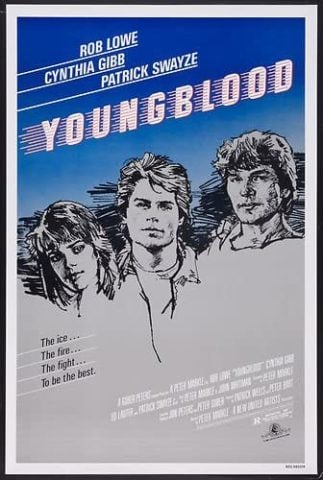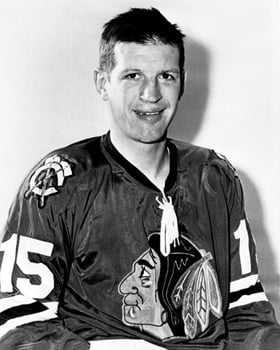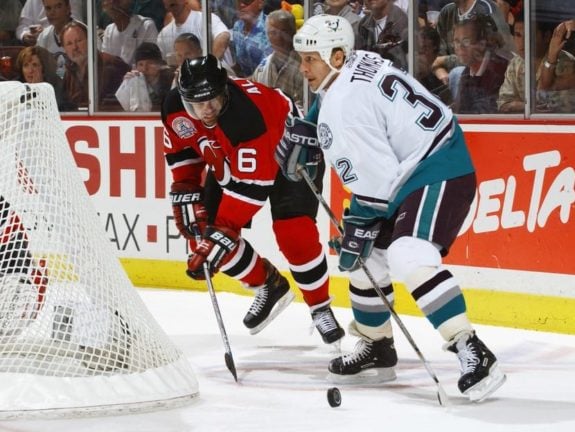“I didn’t want to see another son hurt.”
With those words, actor Eric Nesterenko drives home the central theme of the often-overlooked hockey film Youngblood, released in 1986 and co-produced, co-written and directed by Peter Markle. Though hardly destined to be remembered among the greatest sports movies, the often-dark narrative has allowed it to accomplish something that many films do not: Hold up over time.
Related: Hockey Documentaries to Watch Right Now
The storyline revolves around Dean Youngblood (Rob Lowe), a highly talented but naive teenage hockey player from upstate New York with dreams of playing in the NHL. Upon being offered a tryout with the fictional Hamilton Mustangs in Canada, Dean’s father Blane Youngblood (Nesterenko) voices his strong objections – but, with an assist from Dean’s older brother Kelly (Jim Youngs), himself a former minor league hockey player in the film – reluctantly accedes to his son’s wishes and transports him over the border.
Once there, Youngblood learns the hard way that making it to the highest levels of the sport requires so much more than just skill – and he is forced to run a moral and ethical gauntlet in deciding whether his dream’s collision with reality makes the whole endeavor worth it.

After Youngblood’s arrival with the Mustangs, the film wastes little time in boldly diving into its overarching premise: Exploring the violent underbelly of the sport. Though it carefully avoids serving as an indictment of hockey, the viewer understands immediately that the main character, talented but small and foreign to on-ice physicality, will have to confront and conquer that characteristic of the game he loves if he wants his career to advance.
That violence is personified by the perfectly cast Carl Racki, played by former OHL enforcer George Finn, who is also trying out for the open spot on the Mustangs (From ‘Hockey Cult Movie Youngblood Still a Hit 30 Years Later,’ The Star, 03/30/2016). Knowing that Youngblood is his competition for the job, Racki knocks him around during the tryout session, goading Youngblood into a fight and easily winning it.
Despite that, Youngblood is awarded the roster spot by coach Murray Chadwick (Ed Lauter) – who in the movie was also a former enforcer – and Racki angrily throws around some equipment on his way out the door of the Mustangs’ dressing room.
Youngblood Forced to Confront the Violence of Hockey
Youngblood quickly comes under the tutelage of Derek Sutton (the late Patrick Swayze, a year before Dirty Dancing would rocket him to stardom). Sutton is a tough and experienced forward who’s considered a top pro prospect, and he does his part to school Youngblood in the brutal realities of the road to the top. Youngblood emerges as a dominant offensive player for the Mustangs teaming with Sutton, who serves as a protector in addition to a mentor.
Sutton, however, can only take Youngblood so far. Racki reappears, having been signed by Hamilton’s rough-and-tumble rival, the Thunder Bay Bombers, and Youngblood understands he’ll have to go through Racki and what he represents to take the next step on his journey.
The Mustangs’ battles with the Bombers serve as that dangerous road for Youngblood. Eventually, the mayhem becomes inescapable: Racki, involved in a blood feud with Sutton, brutally attacks him from behind, causing Sutton’s head to hit the ice and putting him in the hospital with a serious injury.
Deeply disillusioned with what he’s experienced and discovered about the game, Youngblood questions what he sees as an unconscionable demand from Chadwick to practice immediately after the game in which Sutton was injured. Given an ultimatum by Chadwick, Youngblood walks out on the Mustangs and returns to his family’s farm.
Related: Val James – The Forgotten Trailblazer
That’s when Kelly goes to work on him. Demanding his younger brother wake up to the hard truths of what it takes to succeed in hockey, he drives his point home in an angry exchange with Dean: “And you NEVER quit. EVER!”
Dean’s anger at Kelly is rooted partially in sibling rivalry: Kelly, a tough guy as a player, suffered an eye injury trying out for a team years earlier. It’s their father that proves to be the pivotal influence for his younger son.
Watching from afar as Kelly teaches Dean how to box after their chores are done, Blane surprises Dean by skating onto the ice where Dean is practicing one night – and revealing to the viewer for the first time that he was also a hockey player. Driving Dean to anger and trying to instigate a fight with his son as a lesson, Blane delivers yet another of the film’s memorable lines: “You can learn to punch in the barn, but you gotta learn how to survive on the ice.”
Timely Humor Helps Balance ‘Youngblood’
Dean angrily asks his father why he didn’t help him earlier, to which Blane responds by expressing his deep reservations over possibly having another son get injured playing such a dangerous sport. The reason for Blane’s trepidation earlier in the film is revealed to stem partly from personal experience, showing that the deep conflict over the price that needs to be paid is hardly exclusive to Dean – an issue that resonates in the current youth sports landscape, with parents today being forced to consider the effects from repetitive head injuries in contact sports.
Having received guidance from father and brother on the dark arts necessary to overcome the Carl Rackis of hockey, Dean returns to the Mustangs, and with Blane and Kelly watching from the stands, delivers the winning goal of the Memorial Cup playoffs on a penalty shot with 3 seconds remaining – over the Bombers, of course (the only team the Mustangs seem to play).
Youngblood then refuses to come off the ice for the final meaningless faceoff opposite Racki. Challenging Racki, Youngblood scores a (largely hard-to-believe) knockout of his nemesis, giving him a hockey championship as well as a symbolic victory over the part of the game that threatened to derail his promising hockey future.

Bearing little resemblance to the uplifting and exhilarating Miracle or the hilarious spoofing of the sport’s stereotypes in Slap Shot, there’s plenty more to Youngblood than just the hockey: The requisite love story between Dean and Chadwick’s daughter Jessie (Cynthia Gibb), which creates tension between coach and player; the friendship between Sutton and Youngblood, which yields other memorable quotes such as “Maybe you can play for the Tallahassee Warthogs, boy”; and Youngblood’s sexual relationship with the older Miss McGill (Fionnula Flanagan), a woman who boards players for the Mustangs and is known to extract just that form of payment for her services.
That plotline is meant to add levity, though it might not present well today given the current climate of modern society, not to mention junior hockey’s sordid not-too-distant history.
Unique ‘Youngblood’ Hockey Scenes Help Carry Movie
Despite that, the film contains just the right amount of humor added in – there’s some (mostly) harmless hazing, team drinking sessions, Youngblood’s embarrassing encounter with Chadwick after Jessie jokingly purchases him a pornographic novel to read on long bus rides to games. Yet, it remains faithful to its central tenet throughout. Despite Jessie being the daughter of the Mustangs coach, her deep distaste for the sport’s violent nature – no doubt a product of watching her father’s career growing up – is laid bare after Sutton is injured and she pleads for Youngblood to quit.
So besides the thoughtful storyline and well-timed humor, why does this movie still resonate? Well … it’s the hockey again. Markle, a former minor-league player, was determined to do those scenes right. This was apparent in his casting and development choices: Nesterenko, who served as the film’s hockey consultant in addition to delivering a strong, understated performance as Youngblood’s father, played two decades in the NHL for the Toronto Maple Leafs and Chicago Blackhawks, scoring 250 goals. The late Peter Zezel along with Steve Thomas, who would go on to successful NHL careers, had roles in the movie, as did numerous other college and junior players.
Even an appearance by a future A-list star that will thrill movie buffs wasn’t random: Keanu Reeves, in his big-screen debut, portrays Mustangs goaltender Heaver – a role he earned in part because he had played goalie in high school and college growing up in Canada. In a casting theme of the movie (more on that shortly), Reeves’ appearance was also notable because he and Swayze would team up again as stars of the action hit Point Break five years after Youngblood was released.
Shot in Toronto in the summer of 1984, the movie’s hockey footage, filmed at tiny Ted Reeve Arena, employed a liberal use of super-slow motion and up-close shots that, when combined with dim lighting, created a heavy, foreboding and claustrophobic feel to the action. Mark Irwin, the cinematographer, devised a special rig for the on-ice scenes. The end result was a unique take on the game that fuels and perfectly serves the movie’s mood – and plays well today.
The acting and production value of Youngblood has aged well, too. Lowe’s star was on the rise at the time, his Brat Pack days underway, and Swayze was also on the verge of his breakout. His strong presence as a future A-list lead actor was apparent in his performance as Sutton, delivering the gritty intensity that became characteristic of his future roles. The movie marked a successful reuniting of the two The Outsiders alums, who played brothers Sodapop Curtis and Darrel Curtis in the now-classic film adaptation of S.E. Hinton’s book released in 1983.

Though it will always be overshadowed by the aforementioned Miracle and Slap Shot as classic sports films, Youngblood has achieved the next best thing: a cult following. Sure, there’s a lot of 1980s hair and some of the bad music of the decade mixed in, but the movie manages to avoid becoming “a product of its time” – essentially, one that works well only for the period in which it was produced.
A staple of late-night cable TV programming for decades, Youngblood has found another consistent outlet of late on NHL Network. Its eagerness to delve into the ugly side of the sport, combined with well-acted performances from a strong cast and excellent cinematography, make for a fun film that easily draws viewers in – often a big problem for hockey fans who come across it on cable when it’s past their bedtimes.